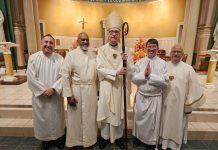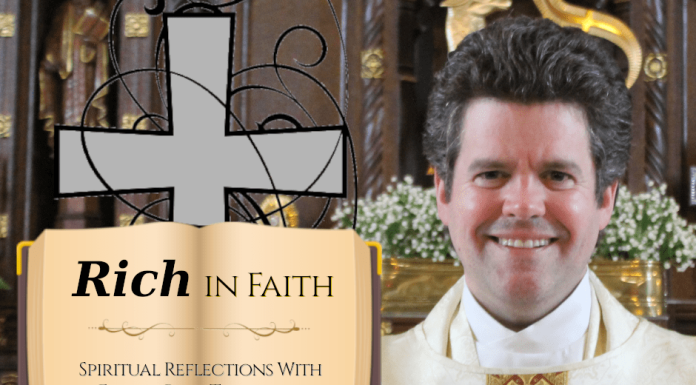Column by Jonathan Nagy
Picture getting in and starting your car and the radio comes to life. You hear a new song that you have not heard before and you find it a catchy and great tune. You cannot really tell who is singing the song, but it appeals to you on many levels. When you are not actively driving, you look up who sang the song, only to find out it is one of your favorite artists. You begin to think about the draw for you to not only that song but every song created by that artist. This has happened to me many times. My car radio is permanently tuned to KLOVE, and they play songs constantly from my favorite Christian artists including Matt Maher, David Crowder, MercyMe, and Chris Tomlin. However, the artist and music that spurred me to think about this was not anyone currently on the radio, or even someone who has been alive for nearly 800 years.
The artist I’m speaking of is none other than Saint Thomas Aquinas. In my recent hymn planning for the summer Masses and selecting choir anthems, the important feasts of the Holy Trinity and Corpus Christi fell during this time. As I looked up hymns to use, I realized how many of these great Catholic classics were written by this remarkable man. Panis Angelicus, Adoro Te Devote, O Salutaris Hostia, Pange Lingua Gloriosi, Tantum Ergo, and so many others were penned hundreds of years ago, with divine inspiration leading the way. A simple internet search produced over 100, with many composers in the years since Aquinas, taking his words and setting them to beautiful music. If one reads, sings, or hears the words of his hymns, one cannot notice a definite pattern.
Thomas Aquinas had a great devotion to the Eucharist. In fact, in 1264, Pope Urban IV asked him to compose the Mass and Divine Office for the newly instituted Feast of Corpus Christi. The Council of Trent used Aquinas’ writings as the basis for its Eucharistic doctrines, and not only has he been named a Doctor of the Church, he is also referred to as a Doctor of the Eucharist. In one of his prolific writings, Aquinas wrote, “The proper effect of the Eucharist is the transformation of man into God.” He often referred to the Eucharist as the “Bread of Angels” because it gives us a taste of the spiritual eating that the angels enjoy in Heaven with God and a peek at what we can look forward to in the afterlife.
Many of Thomas Aquinas’ writings can be very deep and difficult for us to understand. His choosing to write beautifully inspired hymns helps us relate to the true meaning of all things spiritual, especially the Eucharist. One of my favorite moments of the church year is the Eucharistic procession to the altar of repose on Holy Thursday at the conclusion of the Mass of the Last Supper. As the incense soars to the rafters, with all in attendance kneeling, we sing Pange Lingua Gloriosi. As the monstrance is placed on the altar, we sing the benediction verses. While the Latin is much more powerful, here are the loosely translated English words:
Down in adoration falling,
This great sacrament we hail;
Over ancient forms of worship
Newer rites of grace prevail;
Faith will tell us Christ is present,
When our human senses fail.
To the everlasting Father
And the Son who made us free,
And the Spirit, God proceeding
From them each eternally,
Be salvation, honor, blessing,
Might and endless majesty.
In those two simple yet powerful verses, Aquinas sums up basically all of the major Catholic beliefs that we hold so true. The Sacrament of the Eucharist we behold was instituted by Jesus Christ himself. Our faith tells us that He is truly present in the Eucharist, even when our own human senses try to convince us otherwise. Aquinas mentions the great Trinity in the second verse, which has been ever-present. He ends with a fittings line of praise for our Godhead Three in One. Just reading these words excites my heart for the glory of the Eucharist!
Another example of Thomas Aquinas honoring Jesus in the Eucharist comes from Panis Angelicus. Again, the Latin words are more powerful, but the English translation is as follows:
May the Bread of Angels
Become bread for mankind;
The Bread of Heaven puts
All foreshadowings to an end;
Oh, thing miraculous!
The body of the Lord will nourish
The poor, the poor,
The servile, and the humble.
Once again, through simple yet powerful terms, Aquinas explains how the Body of the Lord will nourish and sustain us and all of God’s people. Plenty more examples of his work on the Eucharist exist, and I encourage everyone to explore the writings and hymns of Saint Thomas Aquinas.
The Catholic Church in the United States is entering the second year of the National Eucharistic Revival. This year is focused on the Diocesan level, with small faith-sharing groups encouraged in every parish. The goal of these groups is to bring all closer to Jesus through the Eucharist and Eucharistic Adoration.
Just as Aquinas mentioned that the Bread of Angels gives us a foretaste of what is to come for us in Heaven, I have been privileged to get a foretaste of the Eucharistic small groups. During the Easter season, I was fortunate enough to be part of a group that met with Father John Byrnes each Monday evening to watch a video and discuss the book “33 Days to Morning Glory,” and prepare us for a consecration to Jesus through Mary, which took place on the Feast of Our Lady of Fatima, May 13. It was truly wonderful to be with so many devoted parishioners of all ages, all working towards a similar goal. Often, the conversation would naturally make progressions from topic to topic. I like to refer to these discussions as “Catholicism 101 with Father John.” The questions and answer session, as well as the discussion, were so frank and open, leading even the lifelong cradle Catholics in the room to take a refreshed look at what we believe. I think I can speak for others when I say I took so much away from these meetings and look forward to regrouping in the fall, hopefully adding a few more to our ranks and inspiring other groups to meet. Our post-consecration meeting, which took place a month after the consecration, was so delightful, as we shared how the Blessed Mother had come into and changed our lives since we last met. And as usual, the conversation turned to all things Church.
Discussing our faith is something I truly do enjoy. I love listening to our priests speak about the mysteries of the faith, explaining everything in ways that we can understand. In a way, while they may not be composing hymns, they are doing the exact same thing that Thomas Aquinas did eight centuries ago. The priests are making God tangible, especially the Eucharist, which can be one of the most difficult concepts for our limited human minds to comprehend. Listening to their carefully crafted homilies and talks gives great insight to what God has in mind for each of us. I commend them in their devotion to the great sacrament and their willingness to share their love of Jesus in the Eucharist with each of us. On that note, I challenge everyone to spend time in Eucharistic Adoration. Maybe start small with thirty minutes. The hour+ I spend in silent adoration is often one of the best parts of my week. To be that close to Jesus in His own house is truly awe-inspiring.
I would like to end this article where I began, speaking about Thomas Aquinas’ greatest hits. The fourth verse to his Ecce Panis Angelorum makes clear God’s intentions for all of us in the Sacrament of the Eucharist:
Thou who knowest and willest all things,
Who feeds us mortals by This:
Make thine own to be partakers of,
Coheirs and citizens in
That Holy City of Saints.
Through Jesus Christ in the Eucharist, may we all strive to reach our Heavenly home with God our Father!
Jonathan Nagy, M.Ed., is the Dean of Students and Social Studies teacher at Bishop Carroll Catholic High School in Ebensburg. He is also the Music Director at the Basilica of Saint Michael the Archangel in Loretto.































